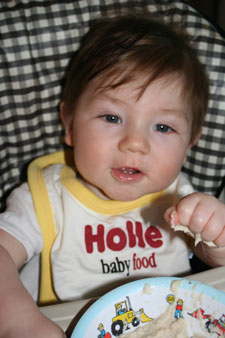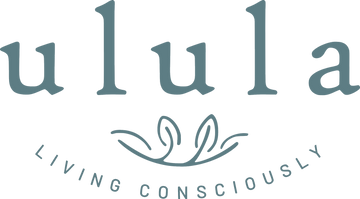
[A weaning baby eating baby porridge - kindly sent in by a customer]
Mums seeking advice on weaning their babies is a frequent topic in my inbox, so I thought I would post a few articles over the coming weeks looking at the weaning process. Today I give some pointers on how to know your baby is ready for weaning and tomorrow on just how to go about starting to wean your baby. The Department of Health recommends that parents should not wean babies before the age of 6 months. This is partly because a baby's digestive system may not be fully developed before this age and also because the risk of a child developing an allergy is said to be greater if solids are introduced before six months. Many parents tell me that they feel this advice is too rigid and that their babies are ready for weaning earlier than 6 months. While introducing solids is possible from about 4 or 5 months, weaning should never be attempted before 4 months, as a baby's developing digestive system simply cannot cope with the demands made of it. Similarly, a number of parents tell me that their baby was not ready for weaning until after 6 months, and that is fine too.
Tune Into Your Baby and Trust Yourself
My feeling is that parents should follow their parental intuition when thinking about when to start weaning their baby. Consider the list of possible signs below and observe your baby - you're the person who knows your baby best, so trust yourself. If there is a family history of allergies, eczema, asthma or hayfever then obviously exclusive breastfeeding or feeding baby milks or formulas would be sensible for the first six months, if at all possible.
Signs Your Baby May Be Ready For Weaning
The following may be signs that your baby is ready to start his or her first tentative steps in eating solids:
- Holding his or her head up and controlling head movements
- Sitting well when supported
- Is eager to chew and making chewing motions
- Attempting to put things in his or her mouth
- Is losing the reflex to push objects out of his or her mouth
- Picking up food and putting it in his/her mouth
- Being unsatisfied after a full milk feed
- Demanding increasing and more frequent milk feeds
- After a period of sleeping through the night waking in the night with hunger
- Displaying curiosity about what you are eating
Weaning Before Six Months
If you decide to wean at any time before six months, there are some foods that should be avoided as these may cause allergies or make your baby ill. These include wheat-based foods and other foods containing gluten (e.g. bread, rusks, some breakfast cereals), eggs, fish, shellfish, nuts, seeds and soft and unpasteurised cheeses. Ask a trusted professional for advice, especially if your baby was premature.
What is your experience of weaning? When did you start and how did you know that your baby was ready for introducing solids?


